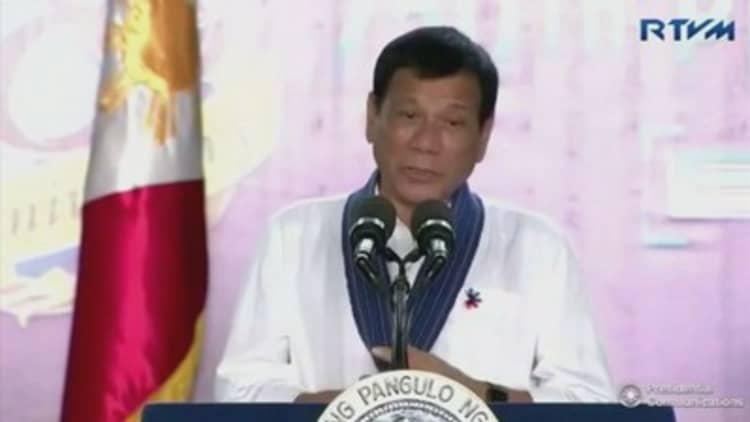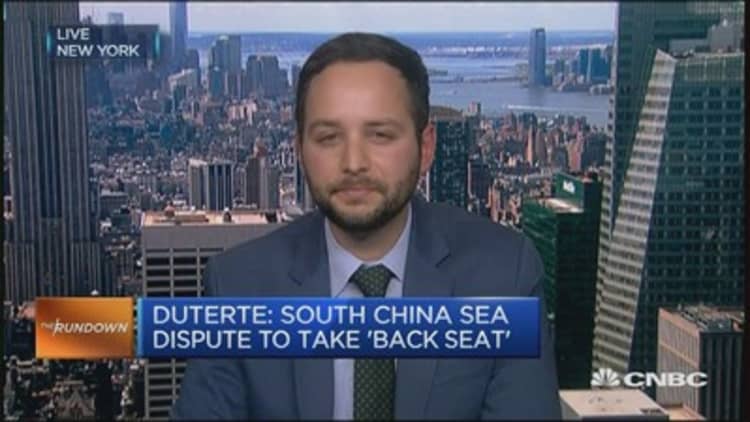
Asian geopolitics and the Philippine economy could undergo profound changes if Manila ends up breaking historic military and economic ties with the U.S. to ally with China instead.
President Rodrigo Duterte announced the "separation" during a state visit to China on Thursday, ending speculation as to whether or not he would follow up on previous threats of "breaking up with America."
Speaking to an audience in Beijing, the outspoken leader said that he had "realigned" himself to China's ideological flow. "Maybe I will also go to Russia to talk to [President Vladimir] Putin and tell him that there are three of us against the world: China, Philippines and Russia. It's the only way," media quoted him as saying.
Philippine policymakers released a statement following his speech, clarifying that their county was not turning its back on the West and adding that Asian integration was long overdue. On Friday, Trade Minister Ramon Lopez told CNN Philippines that his country would maintain its trade and economic ties with the U.S.
In recent weeks, the President has ramped up anti-American rhetoric while simultaneously cozying up towards the world's number two economy to gain Chinese funds and distance his country from the U.S., which has criticized the extra-judicial killings under his war on drugs.
The U.S. State Department said it was "baffled" by the comments. "We are going to be seeking an explanation of exactly what the President meant," said spokesman John Kirby, adding that America wasn't the only one feeling bewildered. "We have heard from many of our friends and partners in the region who are likewise confused about where this is going."
What is a separation?
"Cutting ties with the U.S. doesn't mean cutting all ties. It simply means the unequal, special relations will have to end," Ramon Casiple, executive director at Quezon City-based think tank Institute for Political and Electoral Reform, told CNBC.
One example of these special ties is the visa process. "The Americans can enter the Philippines anytime without visas. Why? Why don't we make it reciprocal?" Duterte said during his Beijing speech.
So, tighter entry requirements for Americans could be on the table, Casiple suggested. Other measures may include changes in access to resources, tax credits and preferential custom tariffs on industries controlled by Americans, or rules regarding U.S. custody of American servicemen undergoing criminal trial, he continued.
Indeed, any form of separation is unlikely to be official in nature given just how strategic of an ally the U.S. is to Manila, analysts said.
"The Philippines depends on the U.S. not just for military cooperation but also for economic support. American firms have invested a lot in the electronic industry. Remittances from the U.S. are large, and a lot of business process outsourcing (BPO) is also by American firms into the Philippines," pointed out Trinh Nguyen, Asia-Pacific economist at investment bank Natixis.
Remittances and the BPO sector are key pillars of the Philippine economy, contributing 10 and 6 percent, respectively, to annual gross domestic product. So if Duterte really did end economic ties, as indicated, it could significantly hit the domestic economy in terms of trade and labor movements, Nguyen added.

What this means for Asia
The move could also alter the balance of power in Southeast Asia.
Neighboring Indonesia, Vietnam and Malaysia are already at odds with China over territorial claims to the South China Sea, a conflict that has weighed on the Association of Southeast Asian Nations (ASEAN). The bloc was under pressure to produce a united stance on the issue during a July meeting but failed to do so after Cambodia, upon China's request, blocked any mention of The Hague's court ruling on the matter in an official statement marking the end of the summit.
Now that the Washington can no longer count Manila as a steadfast ally in Southeast Asia, that could provide Beijing with leverage to expand its grip in the already-tense region, suggested Joseph Franco, research fellow at Singapore's Nanyang Technological University.
"Expect the Indonesians to buff up their presence in the Natunas [islands located in the South China Sea], or for Malaysia to patrol more into its claims."
Another PR stunt?
Still, many were skeptical as to whether Duterte's remark on Thursday indicated a true change in policy.
"Part of me is thinking that this is all just posturing. After the U.S. elections, you could expect the Duterte administration to come back to Washington ... Duterte and his minions are far from being the master chess players they think they are, they are just muddling and bumbling through every day," commented Franco.
The administration has yet to officially execute the breakup request as Washington has not received any formal notice.
Duterte had previously threatened to end a key U.S.-Philippine military pact that would eject American troops from the island nation, but it's unclear whether he will actually do it. The countries carry out 28 joint military exercises each year, while around 107 U.S. troops are involved in surveillance operations against militants in the southern Mindano province.
"Let's see if his words are just to win new friends or will translate to shifting out of the U.S. influence. .. Let's not jump to conclusions just yet," Nguyen echoed.

